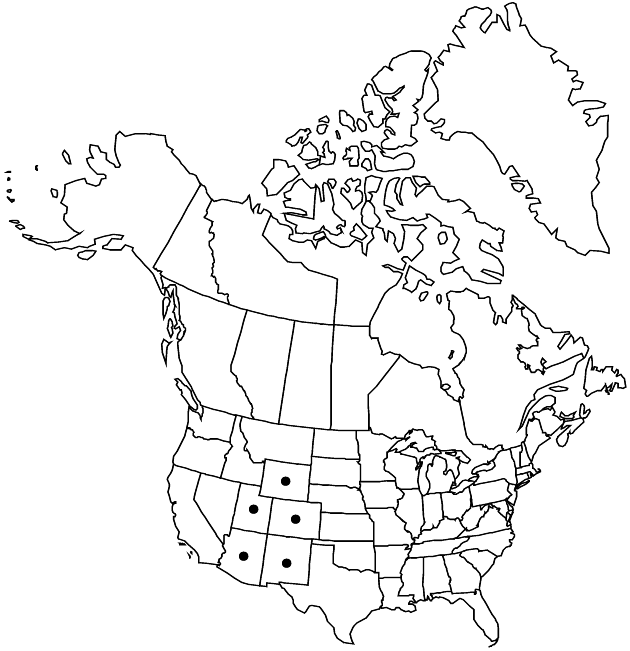Cirsium scariosum var. coloradense
Sida 21: 215. 2004.
Plants usually erect, caulescent (rarely acaulescent), 20–150 cm. Stems usually simple, proximally unbranched, very leafy, ± villous with septate trichomes and/or thinly arachnoid tomentose, often glabrate. Leaves: blades oblanceolate or narrowly elliptic, pinnately lobed, longer spines ± stout, usually 1 cm or shorter, abaxial faces glabrous to thinly gray-tomentose, adaxial glabrous; distal narrow, firm, green throughout or unpigmented proximally. Heads 3–10+, ± sessile or pedunculate, usually in spiciform or racemiform arrays, subtended by ± reduced bractlike distal leaves that often do not overtop the heads. Peduncles 0–18 cm. Involucres 2–3 cm. Phyllaries: outer and mid lanceolate to narrowly ovate, spines slender to stout, 1–5 mm; apices of inner acuminate and entire or serrate, or abruptly expanded into scarious, erose-toothed appendages. Corollas white (rarely purple), 22–29 mm, tubes 11–16 mm, throats 4–5 mm, lobes 6–9.5 mm; style tips 4–6 mm. Cypselae 4–6 mm; pappi 18–25 mm. 2n = 34, 36? (as C. foliosum).
Phenology: Flowering summer (Jun–Sep).
Habitat: Wet soil, forests, meadows, roadsides
Elevation: 1900–2500 m
Distribution

Ariz., Colo., N.Mex., Utah, Wyo.
Discussion
Variety coloradense is common in the mountains of southern and central Colorado with outlying populations in northern New Mexico, northeastern Arizona, central Utah, and southeastern Wyoming. In Colorado it is largely allopatric with the usually acaulescent var. americanum. Some plants from the White Mountains and San Francisco Peaks of Arizona and from Gunnison County, Colorado, approach var. thorneae in having deeply divided, extremely spiny distal leaves that overtop the heads. Putative hybrids between var. coloradense and Cirsium grahamii have been documented in Apache County, Arizona, and between var. coloradense and C. undulatum in Las Animas County, Colorado.
Selected References
None.
Lower Taxa
"fine" is not a number.